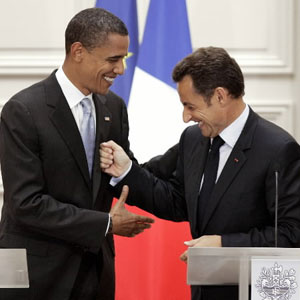Who Does West Prefer

Signals sent by Western officials show that West may tend to see Ahmadinejad as the president of the Islamic Republic for another term. By Javad Mahzadeh.
Political tensions between Iran and West within the past year deteriorated such that even at cases they led to use of inappropriate language by both sides. Nicholas Sarkozy who met Iranian FM Manouchehr Mottaki on Wednesday had made an offensive that he would avoid direct encounter with Mahmoud Ahmadinejad. Later he has also stated that 5+1 would wait for the result of Iranian presidential elections to continue talks with Iran.
Sarkozy has now met Mottaki and discussed Iran’s nuclear program. Before the meeting Elysee had released a statement that the meeting will constitute an opportunity to discuss talks that great powers would like to resume with Iran over its nuclear program.
It seems that Ahmadinejad administration’s tactic in drawing Europeans to the table of negotiations and convincing United States to take the first step and withdraw from some of its demands has been successful –at least for short-term. Unlike North Korea who openly threatens the world with military muscle-flexing, Iran developed an atmosphere which compelled Russia to propose a new plan on Europe’s incentive package for Iran, and forced Obama to foreground Iran in his visit to Middle East. As Ahmadinejad says, now the entire world wants Iran to play a role in regional and international affairs.
After meeting the Israeli FM, Russian Minister of Foreign Minister Sergey Lavrov has talked of a new incentive package West is going to offer Iran. Lavrov has added this time is a good opportunity to solve problems with Iran over is nuclear program. But let’s not forget that along with what Lavrov calls a good opportunity Iran may undergo political changes. It seems that neither France –as Europe’s representative- nor Russia have considered this event in their calculations or otherwise do not regard it as a key development in Iran’s current status.
West’s understanding from Iran’s situation in year 1388 (2009-2010) has become a matter of question. As frequently mentioned, despite Iran’s major influence on the decision-making processes at regional and international levels, no certain activity from foreign governments is observed and no support or opposition towards change of Ahmadinejad’s administration is expressed. But Sergei Lavrov talks of an opportunity in his meeting with the Israeli PM, Sarkozy welcomes Mottaki in Elysee and Obama decides to invite Iranian diplomats on Independence Day celebration- all in one day.
These signals sent tend days before the presidential elections have one similar, concerning meaning. The tenth presidential election was considered as a breakout from economic and political restrictions, a chance to resume détente and an end to the four-year isolation of Iran.
West may assume that Ahmadinejad will keep his office for a second term, hence suddenly moving to action and calling to resume talks with Iran. Inviting Iranian diplomats to 4th of July celebration is truly astonishing. Not an illegitimate regime like Israel, but United States is known as the Great Satan by Iran, and the epithet is mostly used by hard-groups that support Ahmadinejad.
United States and West must have come to the conclusion that the Islamic regime prefers to start the negotiations with the incumbent administration at power. Iran’s contemporary history, from Mosaddeq to Khatami, and from Khatami to Ahmadinejad, reveals hidden facts of in Iran’s power network, which are fully appreciated by West.
West’ likely awareness of the recurrent, cyclic pattern of political process in Iran’s politics has convinced them that they should not miss any more opportunities. Signals sent by West at this specific point, when evidence shows that Ahmadinejad’s opponents are the winners of the election, brings back the conspiracy theory.
If we regard Mottaki-Sarkozy meeting as a prelude to talks with Iran and six world powers, and see the United States’ invitation to Independence Day Celebration as an implicit signal, the conclusion is that West prefers the status quo. Thus, it is sending a message to Iranian leaders that to solve the problems with international community, it is better to keep the incumbent administration in power.
It can be said that West is not looking for political reforms in Iran and despite what the principlists claim, it does not pay attention to the reformist movement. West fears that internal struggles will start again if reformists come to power, and they won’t have the power to actualize their diplomatic goals. Therefore, it prefers to start the negotiations with the current government, even if it implies a trade-off.
For the first time since the Islamic Revolution in Iran, the US Department of State has authorized its embassies and consulates across the world to invite Iranian diplomats to 4th of July receptions. Interestingly enough, the day is titled "Independence Day", the most national and meaningful holiday for Americans.
Notwithstanding the invitation, and Iran’s response, and regardless of progress in Mottaki-Sarkozy talks, West is implicitly supporting Ahmadinejad and sending a message to Iranian leaders to show who it prefers to sit at the table of negotiations.
It is not devoid of truth to say that the victory of reformist movement will bring nothing except attrition and waste of time for West. Shadow governments, restrictions and obstructionisms which all show the true structure of power in Iran, have brought West to the conclusion that it can not achieve its goals in Iran and the region with reformists’ victory. An administration backed by the loci of power is preferred to a straightjacketed administration that has no power.

